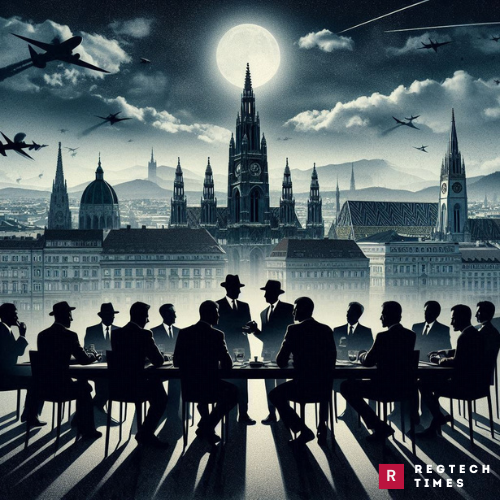In the heart of Vienna, amidst its stately art nouveau architecture and diplomatic calm, a shadowy drama unfolds. Once renowned for its historical charm and cultural richness, Vienna has quietly become a central hub for Russian espionage activities in Europe, drawing concern from intelligence officials and sparking international scrutiny.
The shift began in earnest following the expulsion of 600 Russian spies from European capitals in response to Russia’s invasion of Ukraine. Many of these expelled operatives found refuge in Austria, particularly Vienna, where they have reportedly resumed their covert operations under the guise of diplomatic and administrative roles.
Targeted Incidents and Personalities
One of the most notable incidents in Vienna’s espionage saga involves Christo Grozev, an investigative journalist of Bulgarian origin. Known for his exposés on Russian government activities, Grozev was warned by Austrian and U.S. intelligence agencies of a plot to harm him. Fleeing to the United States in 2023, Grozev now returns to Vienna under heavy state protection, highlighting the severity of threats posed by Russian intelligence operations in the Austrian capital.
According to intelligence reports, the number of Russian state employees in Austria has surged, with over 500 personnel now stationed, a significant increase from previous years. Among them, a substantial proportion are believed to be involved in espionage activities, using Vienna as a base for operations ranging from surveillance and sabotage to financing and recruitment across Europe.
Escalation of Vienna’s Espionage Activities
The operational scale of espionage activities in Vienna is striking. Russian diplomats and support staff occupy numerous properties across the city, some reportedly equipped with surveillance technology aimed at intercepting satellite communications. This infrastructure supports a wide array of covert activities, including industrial espionage and influencing political and economic landscapes in Europe.
Austria’s historical neutrality and its hosting of international organizations have long provided cover for espionage activities. During the Cold War, Vienna was a renowned hub for international spying, a legacy immortalized in cultural references like the film “The Third Man.” Today, Austrian law permits espionage activities as long as they are not directed against Austria itself, a legal nuance that complicates efforts to counter foreign intelligence operations within its borders.
Security Breaches and International Response
Security breaches in Vienna have not been confined to espionage alone. Incidents include the targeting of Western interests, such as tracking arms shipments to Ukraine and carrying out assassinations of defectors residing in Europe. In one chilling case, a Russian military helicopter pilot who defected to Ukraine was tracked down and killed in Spain, allegedly orchestrated with logistical support from Vienna-based operatives.
The implications of these activities are profound for Austria and its European neighbors. Concerns over compromised security and the manipulation of Austrian institutions have prompted calls for stronger counterespionage measures. Recent arrests of Austrian intelligence officials suspected of collaborating with Russian interests further highlight vulnerabilities within Austria’s security apparatus.
Internationally, Vienna’s role as a sanctuary for Russian intelligence activities has strained diplomatic relations. Calls for stricter controls on Russian diplomats and heightened surveillance have gained traction among European Union members, reflecting broader efforts to contain Russian influence and safeguard regional stability.
As Vienna grapples with its newfound status as a nexus of espionage, the United States has also heightened its presence, using the city as a strategic hub for monitoring Eastern Europe and the Balkans. The escalation of incidents, including suspected attacks on U.S. personnel with mysterious ailments like the Havana Syndrome, highlights the escalating stakes in this geopolitical game of shadows.
Diplomatic Repercussions and Strategic Responses
In response to the growing espionage activities, Austrian authorities under new leadership have taken steps to purge suspected Russian sympathizers from their intelligence services and expel diplomats involved in illicit activities. These efforts signal a reevaluation of Austria’s relationship with Russia, aligning more closely with Western allies’ security interests.
Vienna’s transformation into a haven for Russian espionage represents a critical juncture in Europe’s security architecture. The city’s diplomatic and international importance has made it a focal point for clandestine operations, demanding concerted efforts to fortify defenses against external threats while upholding the principles of sovereignty and integrity.
This situation also raises questions about the broader implications for international relations and security in Europe. With Vienna at the center of these espionage activities, the city’s authorities and their international counterparts must navigate a complex landscape of diplomatic challenges and security threats.
Vienna’s emergence as a hub of espionage activities highlights the city’s strategic importance and the ongoing challenges in maintaining security and stability in the region. As intelligence agencies and diplomats work to address these threats, Vienna’s role on the international stage continues to evolve.
The city’s historical legacy as a center of diplomacy and espionage provides a unique backdrop for these developments. However, the modern dynamics of international relations and security demand innovative approaches and robust measures to counter the sophisticated espionage activities taking place within its borders.


